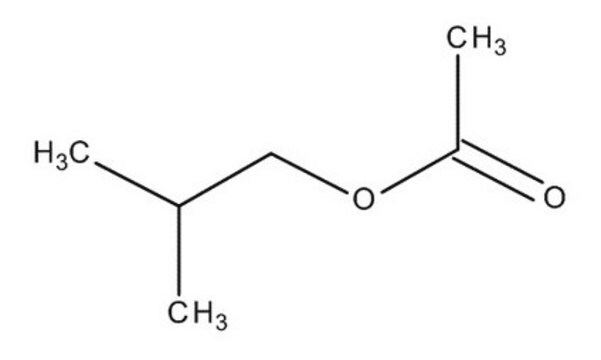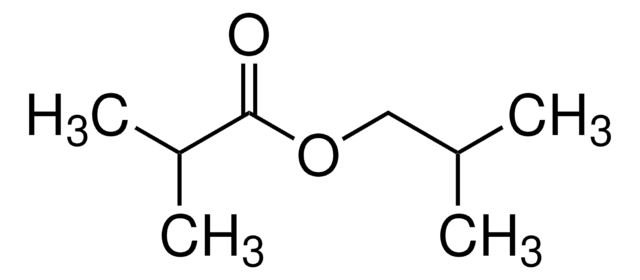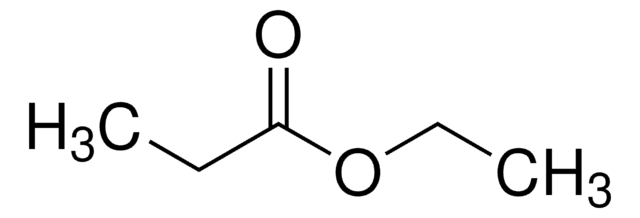537470
Isobutyl acetate
99%
Synonym(s):
Acetic acid isobutyl ester
About This Item
Recommended Products
vapor density
>4 (vs air)
vapor pressure
15 mmHg ( 20 °C)
Assay
99%
form
liquid
autoignition temp.
793 °F
expl. lim.
10.5 %
impurities
≤0.050% (water)
refractive index
n20/D 1.39 (lit.)
pH
6.7 (20 °C, 5 g/L)
bp
115-117 °C (lit.)
mp
−99 °C (lit.)
solubility
water: soluble 5.6 g/L at 20 °C
density
0.867 g/mL at 25 °C (lit.)
SMILES string
CC(C)COC(C)=O
InChI
1S/C6H12O2/c1-5(2)4-8-6(3)7/h5H,4H2,1-3H3
InChI key
GJRQTCIYDGXPES-UHFFFAOYSA-N
Looking for similar products? Visit Product Comparison Guide
Related Categories
General description
Application
- Green Synthesis of the Flavor Esters with a Marine Candida parapsilosis Esterase Expressed in Saccharomyces cerevisiae.: This study demonstrates a green synthesis approach using a marine esterase for the production of flavor esters, including isobutyl acetate. The process employs Saccharomyces cerevisiae, showcasing the potential for sustainable production of flavoring agents in the food and beverage industry (Xue et al., 2020).
- In-line reaction monitoring of entacapone synthesis by Raman spectroscopy and multivariate analysis.: This research employs Raman spectroscopy to monitor the synthesis of entacapone in real-time. Isobutyl acetate is utilized as a solvent in the reaction, highlighting its relevance in pharmaceutical synthesis and process monitoring (Novak et al., 2011).
- Paint thinner exposure inhibits testosterone synthesis and secretion in a reversible manner in the rat.: This study investigates the effects of paint thinner exposure, which contains isobutyl acetate, on testosterone synthesis in rats. The findings provide insights into the potential endocrine-disrupting properties of isobutyl acetate in industrial applications (Yilmaz et al., 2006).
- Preparation of spherically agglomerated crystals of aminophylline.: This research explores the preparation of aminophylline crystals using isobutyl acetate as a solvent. The study emphasizes the compound′s utility in pharmaceutical formulations to enhance drug solubility and bioavailability (Kawashima et al., 1984).
Signal Word
Danger
Hazard Statements
Precautionary Statements
Hazard Classifications
Flam. Liq. 2 - STOT SE 3
Target Organs
Central nervous system
Storage Class Code
3 - Flammable liquids
WGK
WGK 1
Flash Point(F)
71.6 °F - Pensky-Martens closed cup
Flash Point(C)
22 °C - Pensky-Martens closed cup
Certificates of Analysis (COA)
Search for Certificates of Analysis (COA) by entering the products Lot/Batch Number. Lot and Batch Numbers can be found on a product’s label following the words ‘Lot’ or ‘Batch’.
Already Own This Product?
Find documentation for the products that you have recently purchased in the Document Library.
Customers Also Viewed
Articles
Butyl methyl ether; Acetic acid; 2-Butanone; Ethyl acetate; Tetrahydrofuran; 1-Butanol; Isopropyl acetate; Heptane; Propyl acetate; 3-Methylbutanol; 4-Methyl-2-pentanone; Isobutyl acetate; Butyl acetate; Dimethyl sulfoxide; Anisole; Cumene
Protocols
Separation of Acetone; Acetic acid; Propionic acid; Ethyl butyrate; Ethanol; Isoamyl acetate; Isobutyric acid; 3-Methyl-2-butanol; Methyl acetate; 1-Propanol; Acetal, ≥98%, FG; 2-Methyl-1-pentanol; Butyl acetate; Ethyl propionate; 3-Pentanol; 2-Pentanol, 98%; Ethyl isobutyrate; Isobutyl acetate; Acetaldehyde; Furfural; Butyric acid; Methanol; Ethyl acetate
GC Analysis of Class 3 Residual Solvents on SUPELCOWAX® 10
Our team of scientists has experience in all areas of research including Life Science, Material Science, Chemical Synthesis, Chromatography, Analytical and many others.
Contact Technical Service












